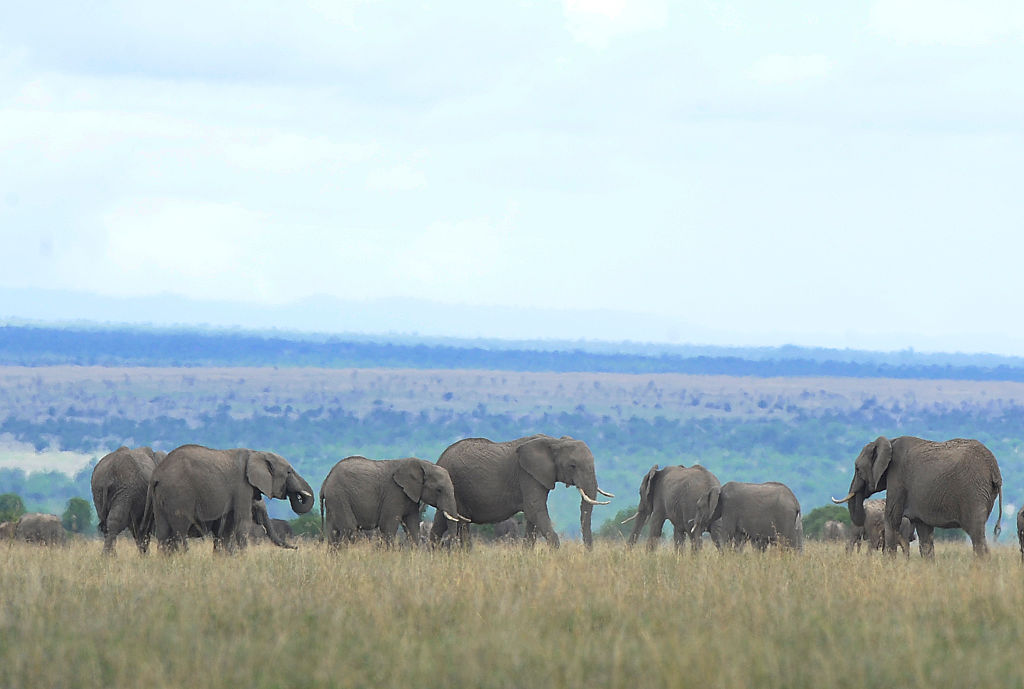Localized extinction almost certain as African elephant population plunges by 30 percent in 7 years


A free daily email with the biggest news stories of the day – and the best features from TheWeek.com
You are now subscribed
Your newsletter sign-up was successful
Scientists estimate that before European colonization, the elephant population in Africa numbered around 20 million. By 1979, that number was a mere 1.3 million. But now, following the first major study of its scale and kind, the population of elephants living in Africa is estimated to be just over 350,000, CNN reports.
Due primarily to rampant poaching, between 2007 and 2014 the number of elephants in Africa dropped by 30 percent. In some regions, it dropped by more than 75 percent:
"When you think of how many elephants occurred in areas 10 or 20 years ago, it's incredibly disheartening," says [Mike Chase, the lead scientist of the Great Elephant Census]."Historically these ecosystems supported many thousands of elephants compared to the few hundreds or tens of elephants we counted."The current rate of species decline is 8 percent, meaning that elephant numbers could halve to 175,000 in nine years if nothing changes, according to the survey — and localized extinction is almost certain.Even before the census offered proof, scientists calculated that far more elephants were dying than being born. Now the species has reached a tipping point. [CNN]
To reach their conclusions, the team of 90 scientists and 286 crew members spent 10,000 hours over 18 African countries to count the elephants from the air. South Sudan and the Central African Republic were not included in the study results due to armed conflict, nor was Namibia, which refused to release numbers.
The Week
Escape your echo chamber. Get the facts behind the news, plus analysis from multiple perspectives.

Sign up for The Week's Free Newsletters
From our morning news briefing to a weekly Good News Newsletter, get the best of The Week delivered directly to your inbox.
From our morning news briefing to a weekly Good News Newsletter, get the best of The Week delivered directly to your inbox.
"[Elephants] are our living dinosaurs, the romance of a bygone era, and if we can't conserve the African elephants, I'm fearful to think about the fate of the rest of Africa's wildlife," Chase said. Read the full report on the elephant census at CNN.
A free daily email with the biggest news stories of the day – and the best features from TheWeek.com
Jeva Lange was the executive editor at TheWeek.com. She formerly served as The Week's deputy editor and culture critic. She is also a contributor to Screen Slate, and her writing has appeared in The New York Daily News, The Awl, Vice, and Gothamist, among other publications. Jeva lives in New York City. Follow her on Twitter.
-
 How the FCC’s ‘equal time’ rule works
How the FCC’s ‘equal time’ rule worksIn the Spotlight The law is at the heart of the Colbert-CBS conflict
-
 What is the endgame in the DHS shutdown?
What is the endgame in the DHS shutdown?Today’s Big Question Democrats want to rein in ICE’s immigration crackdown
-
 ‘Poor time management isn’t just an inconvenience’
‘Poor time management isn’t just an inconvenience’Instant Opinion Opinion, comment and editorials of the day
-
 Nobody seems surprised Wagner's Prigozhin died under suspicious circumstances
Nobody seems surprised Wagner's Prigozhin died under suspicious circumstancesSpeed Read
-
 Western mountain climbers allegedly left Pakistani porter to die on K2
Western mountain climbers allegedly left Pakistani porter to die on K2Speed Read
-
 'Circular saw blades' divide controversial Rio Grande buoys installed by Texas governor
'Circular saw blades' divide controversial Rio Grande buoys installed by Texas governorSpeed Read
-
 Los Angeles city workers stage 1-day walkout over labor conditions
Los Angeles city workers stage 1-day walkout over labor conditionsSpeed Read
-
 Mega Millions jackpot climbs to an estimated $1.55 billion
Mega Millions jackpot climbs to an estimated $1.55 billionSpeed Read
-
 Bangladesh dealing with worst dengue fever outbreak on record
Bangladesh dealing with worst dengue fever outbreak on recordSpeed Read
-
 Glacial outburst flooding in Juneau destroys homes
Glacial outburst flooding in Juneau destroys homesSpeed Read
-
 Scotland seeking 'monster hunters' to search for fabled Loch Ness creature
Scotland seeking 'monster hunters' to search for fabled Loch Ness creatureSpeed Read
